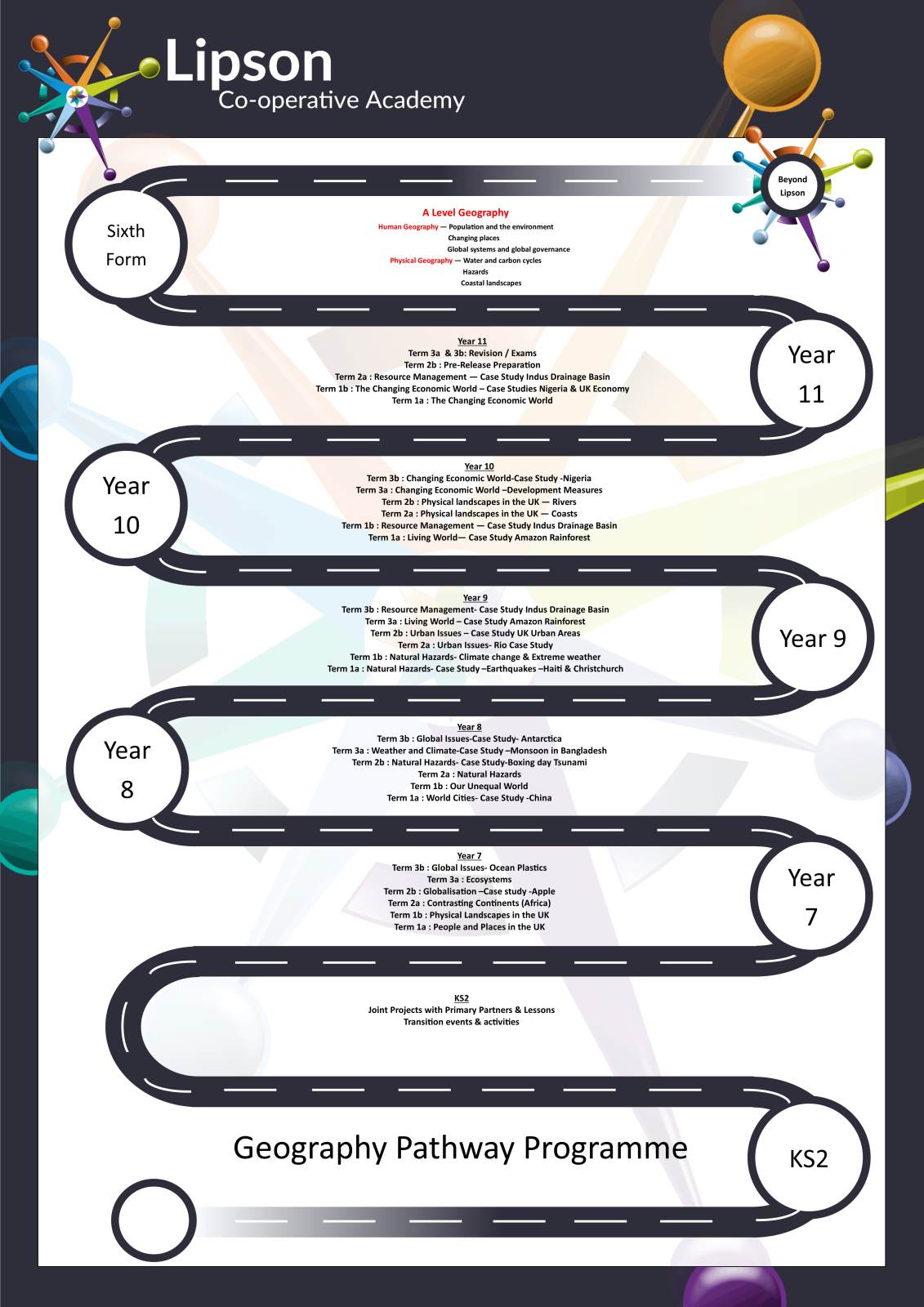Geography
Geography is the study of the world and the exploration of the relationships between people and their environment. Geographers explore the physical properties of the Earth and the history and impact of the human societies who live here. Geography seeks to understand where things are found, why they are there, and how they develop and change over time. It is an amazing subject that literally opens up the world and it is one our department is passionate about.
Our three intrepid explorers and subject specialists Mr Jones, Mr Drinkwater and Mrs Blampied create a world of excitement, creativity and critical thinking about the world that equips our budding Geography students with the skills to discover everything it has to offer. We bring the subject to life and as Mr Jones is also an examiner for AQA, we have a thorough understanding of the exam requirements and can fully support our students to achieve the examination success they deserve.
Meet the team
- Helen Netting - Head of Geography
- Thomas Barnes - Teacher of Geography
- Anna Billing - Teacher of Geography
- Danielle Blampied - Teacher of Geography
- Lisa Hayward - Teacher of Geography
- Struan Mitchell - Teacher of Geography
Intent
Our department instils a love of Geography in all our students. Our curriculum is organised in a way that provides learners with the best opportunities to be successful. We focus on developing depth of learning by creating a mastery within the curriculum, which stretches learners, accelerating their progress over our 7 Year learning journey.
We have planned our curriculum across the key stages to ensure students’ knowledge is secure before moving on, hence we revisit topics regularly, providing students with an opportunity to consolidate their knowledge in order to deepen their understanding.

Our Curriculum Learning Pathway

Geography Curriculum Pathway (PDF)
Transition & building on KS2
As a department, we have collaborated with our local Primary schools to identify what is being taught in Geography at KS2 hence we know what students are taught at KS2 and understand any gaps in students’ geographical knowledge. We have used this to adjust our KS3 to fill these gaps and build on prior knowledge. See the curriculum overview link above for specific information on how the Geography Curriculum links to KS 2 and through the Lipson chronological year groups.
Implementation
What do our students learn?
Geography is a content heavy subject covering a broad range of topics. Our curriculum is sequenced to develop students’ geographical knowledge.
The main concepts covered are:
- Locational knowledge on a variety of scales and a focus on Asia, Africa, Russia and the Middle East.
- Physical geography e.g. Plate tectonics.
- Human geography e.g. urbanisation.
- Geographical skills e.g. map skills.
What Examination Courses do we follow?
Our students follow AQA GCSE Geography and AQA A-level Geography.
In the classroom we create a doorway to the world. Through extra-curricular & online activities we ensure Geography is something that is active and exciting on both a local and national level.
How do we enrich our subject outside the classroom?
At KS3, all students study units based around fieldwork, in which students go out, collect data and apply their understanding to real world phenomena. This includes visits to Paignton to complete a land use study as well as visits to the Eden Project to study biomes of the world.
At KS4 and KS5, fieldwork on both physical and human geography is a compulsory element to the course. KS4 visits have included river studies on Dartmoor and land use studies in Tavistock whilst KS5 has involved a coastal erosion study at Slapton as well as looking at the impact of tourism in Looe and regeneration strategies in Plymouth. The department has also offered visits to Paris as part of the Academy Enrichment week.
Impact
Geography is about more than just examination success. It is about:
- Understanding the world and our place in it.
- Developing a range of skills that extend beyond the classroom.
- Developing resilience and working skills,
- Working together and independently.
- Solving problems and posing questions.
- Developing our research skills
- Ensuring we are informed about numerous topics, which impact our lives.
- Finding our voices and making a difference in our world.
How do you measure attainment and progress?
We measure student progress based on the following assessment objectives:
- AO1: Knowledge of locations, places, processes, environments and scales
- AO2: Geographical understanding of: concepts and how they are used in relation to places, environments and processes
- AO3: Apply knowledge and understanding to interpret, analyse and evaluate issues to make judgements
AO4: Select, adapt and use a variety of skills and techniques to investigate questions and issues.
Useful websites and Reading Opportunities
- Seneca- https://senecalearning.com/en-GB/
- https://www.bbc.co.uk/bitesize
- https://www.coolgeography.co.uk
- https://www.worldmapper.org
- https://www.bbc.co.uk
- https://www.gapminder.org
- http://www.ducksters.com/science/ecosystems/desert_biome.php
- http://www.sciencekids.co.nz/sciencefacts/earth/desert.html
- http://kids.nceas.ucsb.edu/biomes/desert.html
- http://www.defenders.org/desert/basic-facts
